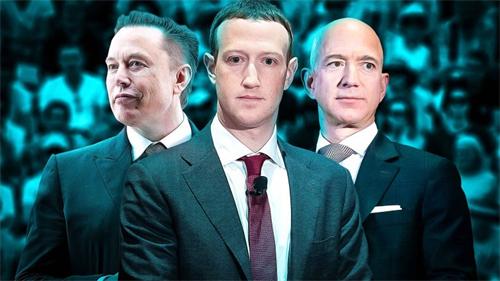The $536 Billion Wealth Plunge: Understanding the Overnight Losses of Musk and Zuckerberg

In a stunning turn of events, recent policy decisions have led to a significant erosion of wealth among some of the world's richest individuals. Elon Musk and Mark Zuckerberg, prominent figures in the tech industry, collectively saw their net worths diminish by a staggering $536 billion in just two days. This article delves into the factors contributing to this unprecedented financial downturn.
The primary trigger for this massive wealth decline was the implementation of sweeping global tariffs by President Donald Trump during his second inauguration. These tariffs disrupted international trade, particularly affecting companies heavily reliant on Asian manufacturing. Major corporations, including Tesla, Meta, Amazon, and luxury brands like Nike and Burberry, experienced sharp declines in their stock values. Consequently, the combined net worth of the world's 500 richest individuals plummeted by $536 billion over a span of two days.
Elon Musk bore the brunt of this financial upheaval. His net worth, which had peaked at $486 billion in December 2024, nosedived by $148 billion by March 2025. This decline was primarily attributed to a 45% drop in Tesla's stock value, exacerbated by investor concerns over Musk's dual roles as Tesla CEO and advisor to President Trump. His involvement in the newly established Department of Government Efficiency (DOGE) was perceived as a distraction from his corporate responsibilities, further unsettling investors.
Mark Zuckerberg, too, faced significant financial challenges. His net worth experienced a decline of $27 billion, marking a 15% decrease. The downturn was largely due to a 14% drop in Meta's stock price, influenced by market reactions to the newly imposed tariffs and concerns over potential regulatory impacts. This shift underscores the vulnerability of tech giants to geopolitical and policy-induced market fluctuations.
In contrast to Musk and Zuckerberg, Warren Buffett's conservative financial strategy proved advantageous. By selling stocks and accumulating a $300 billion cash reserve in 2024, Buffett positioned himself to weather market volatility effectively. While the broader market suffered, Buffett's net worth increased by $11.5 billion year-to-date, highlighting the benefits of liquidity and cautious investment approaches during uncertain times.
The rapid erosion of wealth among tech billionaires serves as a cautionary tale about the interplay between politics, policy decisions, and market dynamics. It underscores the susceptibility of even the most robust tech companies to external shocks and the importance of strategic diversification and risk management. As global markets continue to navigate these challenges, stakeholders must remain vigilant and adaptable to the ever-evolving economic landscape.
Recommend for you:

Lenovo Legion Go 2: Detachable Controllers Meet High-End Gaming
Building upon the original Legion Go's innovative design, the Legion Go 2 introduces several enhancements aimed at delivering a superior gaming experience.
How Brain-Computer Interfaces Are Ushering in an Era of Human-Machine Symbiosis?
In 2025, Elon Musk’s brain-computer interface (BCI) company Neuralink announced a milestone: its first implantable device had successfully completed its third human trial, with all participants’ devices functioning “optimally.”
How 'Wild Veggie' Farming Is Fueling a $50M Craze?
A notable example is the emergence of 'Wild Veggie' farming, which has captivated investors, amassing $50 million in funding.
Xiaomi 15 Ultra: A Leap Forward in Smartphone Technology
With a focus on advanced camera capabilities, robust performance, and rapid charging, the 15 Ultra is poised to make a significant impact in the premium smartphone market.
